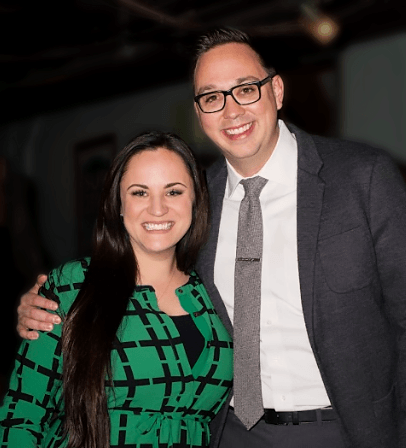One of the benefits to using the best operating system for your company is seeing the results of having the right people in the right seats. We had the opportunity to sit down with a V/I (Visionary/Integrator) Duo™ to get a first-hand account of their experience with EOS® at their company.
With palpable enthusiasm and plenty of cheeky humor, Nicole Mennicke and Tyler Dolph of Rocket Clicks – a digital marketing agency in Wisconsin – proved that using the right operating system can not only benefit your company’s success, but create invaluable working relationships for years to come.
Nicole Mennicke (left) and Tyler Dolph (right)
So, when Rocket Clicks was first adopting EOS, was there any question as to who would be the Visionary, and who would be the Integrator?
Immediate laughter from both
Nicole: Yes. There were a LOT of questions about it. We self-implemented in 2014, and only adopted parts of it, so it was a total disaster at first. Then, when Tyler came on board, Jeff found our EOS Implementer®, John LaFontsee, and we went through all of it together in 2015. I said that Tyler was the integrator, and our less involved founder/owner was the Visionary. Honestly, I was afraid to be a remote integrator.
John had us take integrator/visionary assessments, and our results were opposite ends of the spectrum from each other, Tyler clearly visionary and I was solid as an integrator. It was really clear who should do what, but we fought it for probably about 6 months before we finally came to the realization that we should be the two to take those specific roles.
Tyler: That was verbatim what I was going to say.
How did you find out about EOS, and why did you decide to use it?
Nicole: Our owner is the king of reading professional leadership books, and then immediately wanting to implement what he learns. So, he came to us with yet another book and just said, “This is it. This is what we need.”
Tyler: Nicole was a little hesitant at first after we tried self-implementation and needed to start over, but as you can clearly tell, she has fully embraced it now. It was pretty fun to watch that come full circle.
A reset makes all the difference! Has your EOS journey changed your working relationship at all?
Nicole: Tyler. Take it away.
Tyler: Candidly, there was definitely a power struggle early on, because we didn’t know our boxes, we didn’t understand our roles. EOS gave us that clarity. It allowed us to live inside the boxes that we’re most comfortable in and do the things we’re best at. It’s really given us the confidence and authority to not only assume those roles, but embrace them. Before that, we had been trying to do the best we could, we just kind of kept getting in each other’s way.
Nicole: I think we also tried to stick too closely to the examples in Traction and cram ourselves into the pre-structured boxes. EOS examples have things laid out a certain way, and we actually decided to shift just a couple of roles around between the two of us based on our own personal strengths and weaknesses.
Have there been a lot of role shifts and adjustments like that?
Tyler: It’s been circumstantial. As events occur and things happen within the business, we will have conversations about who does what, and who should report certain things, what my talking points should be vs. Nicole’s, and that just naturally translates into execution. We’ve built a really strong and healthy relationship now where we can talk candidly, and we don’t need to live inside a very rigid structure if it’s not working for us.
Nicole: We’re also both really into taking professional personality tests. I think the more we realize how we both work and operate, it’s easier to tell which roles should be owned by each person without hurting each other’s feelings.
A quick fun one: Take turns describing the other person’s work style.
Tyler: Do you want to go first?
Nicole: I’m thinking. I’m an integrator, I need a minute to process.
Tyler: Nicole’s work style is scheduled, regimented and execution-based. And if her inbox gets too full, she has anxiety. Everything is done on time, and with incredible accuracy. I can ask her to do something, and that’s the end of it. I never need to follow up, I never need to ask where it is. I just know whenever and wherever it’s due, it’ll be there and it’ll be great.
Nicole: Tyler’s work style is super high energy, at times random, but always big-picture, long-term thinking. Often “pie in the sky,” which I love. He actually gets a ton done. He lives by his physical notebook, with gentle reminders from our shared integrator/visionary list that I keep. Once it’s in his notebook, you’re pretty good. You’ve got your system.
On a similar note, what’s the hardest thing about working together? What’s the best thing about it?
Tyler: The best thing is easily our relationship, and the work that we put in to understanding each other so there’s no awkwardness or negativity. I can come to work everyday and know exactly what to expect from her. It’s great and gives me a lot of confidence. The worst thing about working with her is she holds me accountable for stuff I don’t want to do. She makes me have difficult conversations when I don’t want to.
Nicole: Definitely my remote status, for both best and worst. I felt so sad for Tyler when we had to all go remote, because Tyler is such a people person, and when I came into the office, no one was around. It’s always so much fun when I’m in the office, because we get so much done. But like I said, my remote status is also the best part, because we have such different styles of working, and being remote kind of gives us the space to work through things the way we can process it best.
Tyler: We also use specific tools that help us communicate better. For example, when we’re talking about things we feel really passionate about, we use a strategy called “From 1 to Care.” So, if we’re talking about something and she’s a 4, and I’m an 8, she knows not to fight me on it because I’m a strong 8, and she doesn’t care as much as a 4. The only rule is everything can’t be an 8 or 9. You can use that in your relationships, too. It’s effective.
Nicole: Oh god. Tyler’s giving relationship advice. Let’s keep going.
Tyler: Feel free to publish that part.
Describe a time when you went through something difficult together. What was it like? How’d you pull through it?
Tyler: Losing both directors within a month of each other was quite a challenge. Similar to how we handled COVID, we needed to come together and be super transparent about what our options were and how we should pick stuff up. True to Nicole’s fashion, she just said “I’ll take it on,” even though she shouldn’t have had to, and it just ended up working really well.
Nicole: Best decision ever. Up until then, we had no transparency with our team. It was kind of scary making that decision, because we realized if we open up the veil to things like finances, state-of-the-company, etc., we would never be able to close it again. So we needed to decide “Can our analysts and managers handle understanding revenue, expenses, etc.?”
Tyler: But it was so cool to see the buy in after everyone understood the numbers. It really helped people understand how their work benefited everyone. It was so great.
You mentioned how you handled COVID. How has that affected your relationship with each other? How about with the company?
Tyler: With each other, nothing has changed. We certainly have more fun together when we’re in person, though we probably get a little less work done. As far as the company, we’ve had the luxury of having Nicole working remotely anyway, so we already knew how to communicate that way. That relationship with the team hasn’t changed.
For me, I need to be better about communicating with the team via the online platforms we have. When I saw everyone every day, we’d chat and interact. In this world, if we’re not talking about a client, I would feel weird if I just randomly called someone up to say “Oh, hey, how’s it going?” So, from a culture aspect, that has been the most difficult part for me.
Nicole: For me, Tyler’s and my relationship is stronger than ever. I’m going to be vulnerable for a second: We were really scared when COVID hit. There was a rock bottom feeling to it. We had some extremely difficult conversations. We’ve said many times, “Moments like this will define us as leaders, and what we do today will be the only thing our people remember for the rest of their time with Rocket Clicks.” We just needed to prioritize transparency and honesty. The trust between each other and with the company is stronger than ever because we had a “nothing left to lose” mentality, and it allowed us to build things back in a very natural and honest way.
That’s awesome. When those conversations started, did you ever consider straying away from EOS, or did you kind of double down on purity?
Nicole: Interestingly enough, we had our leadership team quarterly planning meeting days before the state shut down. We said, “Okay, guys. This quarter is going to be extremely non-traditional, but we will not miss a single Level 10 Meeting™ the entire quarter. Whatever we need to do to keep going.” That was the smartest thing we did. I seriously believe EOS saved our business.
You can connect with Tyler Dolph and Nicole Mennicke on LinkedIn, or visit the Rocket Clicks website to learn more.


